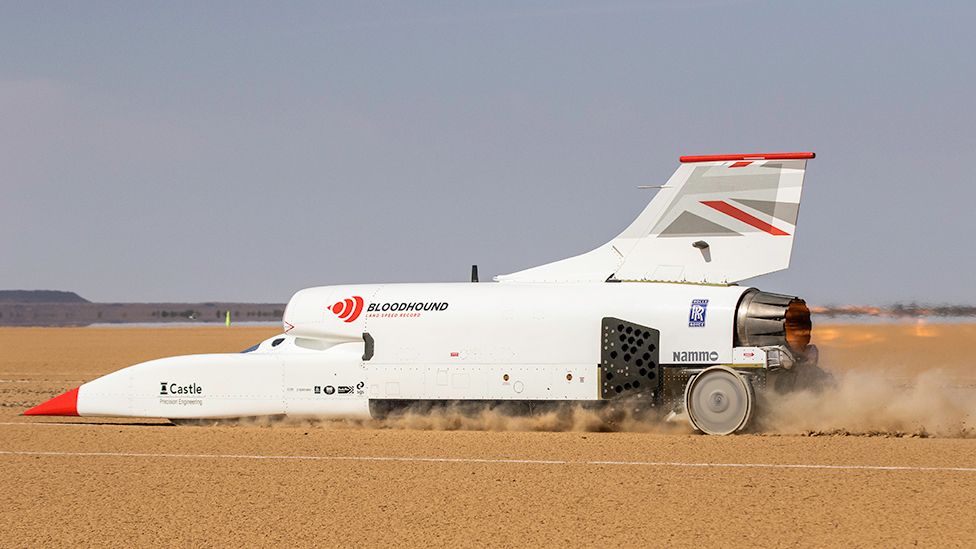Bloodhound goes faster still at 491mph
- Published

The Bloodhound supersonic car has reached its highest speed yet of 491mph (790km/h).
Tuesday was the sixth time the arrow-shaped racer had run across Hakskeen Pan in South Africa.
Each time it goes out, driver Andy Green pushes the vehicle a little more, gathering the data that will enable it to safely break the sound barrier, and the land speed record of 763mph.
That can't happen until 2020, when a rocket is added to the car.
At the moment, Bloodhound is operating on just the thrust of its Eurofighter EJ200 jet engine. But as Tuesday's outing showed, this vehicle has tremendous potential.
Allow YouTube content?
This article contains content provided by Google YouTube. We ask for your permission before anything is loaded, as they may be using cookies and other technologies. You may want to read Google’s cookie policy, external and privacy policy, external before accepting. To view this content choose ‘accept and continue’.
"The EJ200 caned the car all the way up to 500mph, or rather just a fraction under. 491mph," Wing Commander Green told BBC News.
"The principal aim of today was to measure the slowdown, from 500 down to 200, to measure the aerodynamic drag. We've got all that data; it's now back to crunch the numbers."
It's a remarkable sight to witness Bloodhound roll away from its start point.
The car departs in a cloud of dust as the dried mud that covers this flattest of pans kicks up into the air. Once the dust clears, Bloodhound is nowhere to be seen. It's disappeared through the heat haze and has thundered over the horizon.
A second run was planned for Tuesday but was abandoned when inspections at the far end of the 10-mile-long (16km) track revealed some bodywork damage.
It's nothing serious. The titanium panelling that protects the rear suspension is peeling back as the air and dust sweeps past it.
Engineers will resurface the panelling before sending Bloodhound back out on to the track later in the week. It will be Thursday at the earliest, but all depends on the weather.
One of the key discoveries in these high-speed trials has been the safe limit for crosswinds.
With its big tail fin, Bloodhound is sensitive to anything that blows across its path. It makes the car step out of line, and if the winds on Thursday start gusting above 10mph (8.5 knots), then "run profile 6b", as it will be known, will be pushed back.
Chief Engineer Mark Chapman is extremely pleased with the way the test programme is progressing. The inevitable technical niggles aside, Bloodhound is meeting expectations.
"We did one run today. OK, we'd like to have done a second, but in terms of the data return, the one run we did manage has been the most useful since we've been out here," he said.
Andy Green: "We got the data we were looking for"
Bloodhound is festooned with sensors. It's their information which must verify all the computer modelling that went into the design of the car. The team has a good idea of how Bloodhound should behave as it approaches the sound barrier, but it's only by running the car that they'll find out for sure.
Watching on is team owner Ian Warhurst. The Yorkshire businessman rescued the project when it hit financial trouble at the end of last year.
He's underwritten the trials but says he wants sponsorship to fund Bloodhound's next stage - an assault on the land speed record proper, with a target of driving beyond 800mph.
So, what does the car have to demonstrate here at Hakskeen Pan to persuade those sponsors to put their name on the side of the vehicle?
"We just need to keep doing what we're doing: getting the car to run faster and faster and successfully achieve its run profiles; to have a vehicle that's eminently capable of doing what it's supposed to do. And that's what we're proving," he told BBC News.
The current land speed record of 763mph (1,228km/h) was set in 1997, also by Wing Commander Green.
In doing so, he also became the first person in history to take a wheeled vehicle beyond Mach 1, the speed of sound.
Last week, Bloodhound posted a speed of 461mph (742km/h). That made it the third fastest British car of all time, behind Thrust2, which broke the land speed record in 1983; and Andy Green's 1997 car, Thrust SSC.
Follow Jonathan on Twitter.
Ian Warhurst: "I'm really proud of what the team has achieved"